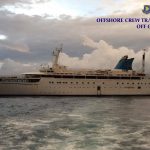The tropical idyllic country of Sri Lanka lies at the centre of the Indian Ocean straddling one of the busiest shipping lanes in the world, where all ships between the Far East and the Middle East or Europe transit; tankers taking oil to quench the growing demand of the oil guzzling vibrant economies of Asia and cargo ships carrying finished products to the hungry markets of Europe from manufacturing plants in Asia.
The excellent location of Sri Lanka coupled with regular flight connectivity to most parts of the world has made this small island, which is a tourist paradise, ideal for crew changes. The COVID-19 pandemic and the relatively low impact of the virus in the country has enhanced the importance of the country for crew changes. Having realised this, the country has come up with a unique operation that is really a lifeline for seafarers.
The concept is simple, yet effective.
In its efforts to contain the virus, Sri Lanka, like any other country on the world, does not allow anyone to arrive in the country freely, but in order to provide a lifeline to stranded seafarers, has positioned a passenger ship as a transit hub, called the Offshore Crew Transit Hub, for arriving seafarers to remain without interacting with the local populace. That ship is used as a transit hub for both on signing and off signing seafarers until the connectivity is established with the flight or the ship.
Since seafarers are not permitted to arrive in commercial passenger flights with other passengers joining the society, seafarers have to arrive in chartered flights and directly transferred to the Offshore Crew Transit Hub in disinfected dedicated buses. Similarly, off signing seafarers remain in the transit hub and repatriate in chartered flight, mostly in the same flight that has brought their reliefs.
Understandably, seafarers arriving by chartered flights are required to have a negative PCR report of a test taken within 72 hours of the flight and certified to have stayed in isolation from the time of the test. That effectively eliminates any possibility of virus being imported through any one of them.
What a progressive step! The Sri Lankan government has been deeply concerned by dire straits of seafarers stranded at sea, hopelessness of relief seafarers waiting for employment, and predicament of ship owners and ship managers unable to change crew. The authorities were aware of reports by IMO and ICT amongst many others, that about 400,000 seafarers are stranded at sea waiting to change but unable to as most countries do not accept them.
The concept has added an extra dimension also. Since seafarers are permitted to arrive only in chartered flights and not commercial passenger flights, other avenues have been probed, especially of countries close-by that allow seafarers to arrive by commercial passenger flights. Thereafter, a chartered flight would be arranged to Sri Lanka from these locations fulfilling the requirement of Sri Lanka about seafarers arriving in the country by chartered flights. Male in the Republic of Maldives and Dubai of UAE both allow seafarers to arrive by commercial passenger flights. Any seafarer from any part of the world, may be from Philippines, Indonesia, China or Europe just has to get to these airports and then proceed to Sri Lanka in chartered flights arranged by the operator. Alternatively, they can come directly to Sri Lanka in chartered flights from home country.
In order to give credence to the operation, Sri Lanka has gone one step further of carrying out the operation through a Public-Private-Partnership. It is understood that the whole process has been conceptualised and mooted by Avant Garde Maritime Services (AGMS), the leading provider of maritime security against sea piracy a few years ago when sea piracy was rampant. They have joined hands with a security company called Rakna Arakshaka Lank Ltd (RALL), which is a Government Owned Business Undertaking (GOBU), where RALL monitors, controls and audits the operation on behalf of the government to ensure strict adherence to established stringent health protocols.
Sri Lanka has highly qualified medical practitioners in every field providing an advanced and vibrant health care system that has risen to the occasion and established protocols and Standard Operating Procedures (SOPs) for crew changes of international seafarers.
In turn, the PPP has also established stringent SOPs, complementing the process.
Now it’s up to the shipping industry to take advantage and reap the benefits.
This is relief for the whole international shipping community, mostly for seafarers, without whom international trade would come to a complete standstill.
An interesting footnote, which most seafarers know, is that the English Word Serendipity, meaning good fortune or luck, coined by Horace Walpole in the eighteenth century was about the idyllic Indian Ocean country of Sri Lanka, which in the present context is most appropriate.











